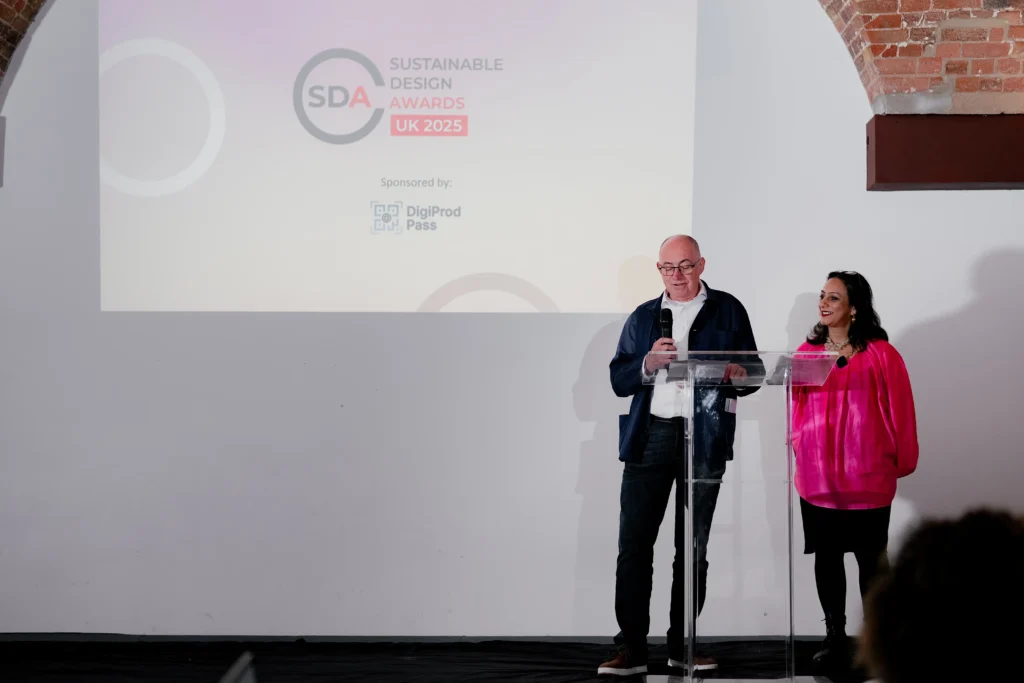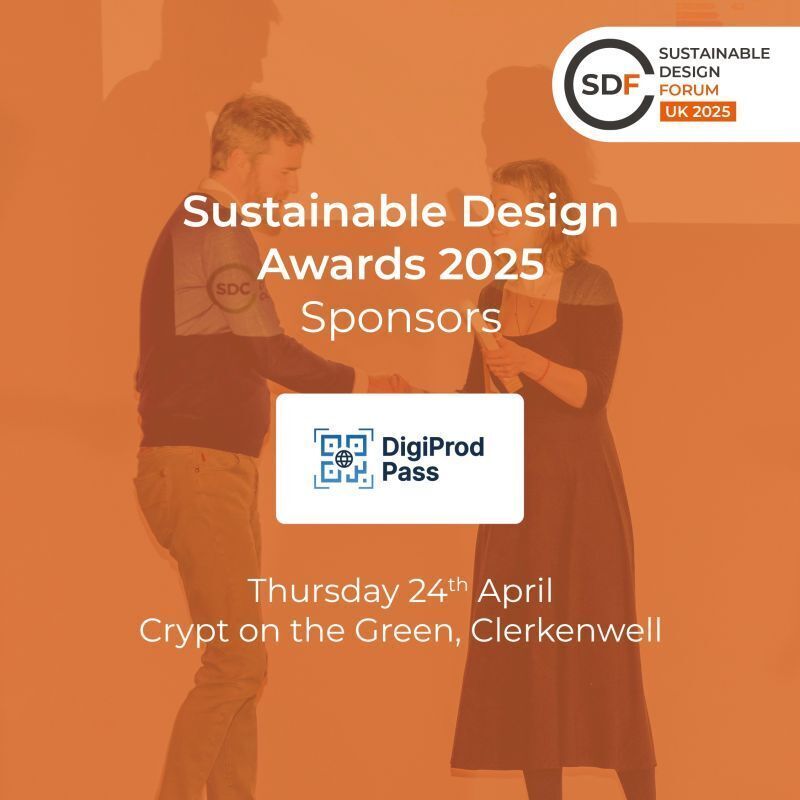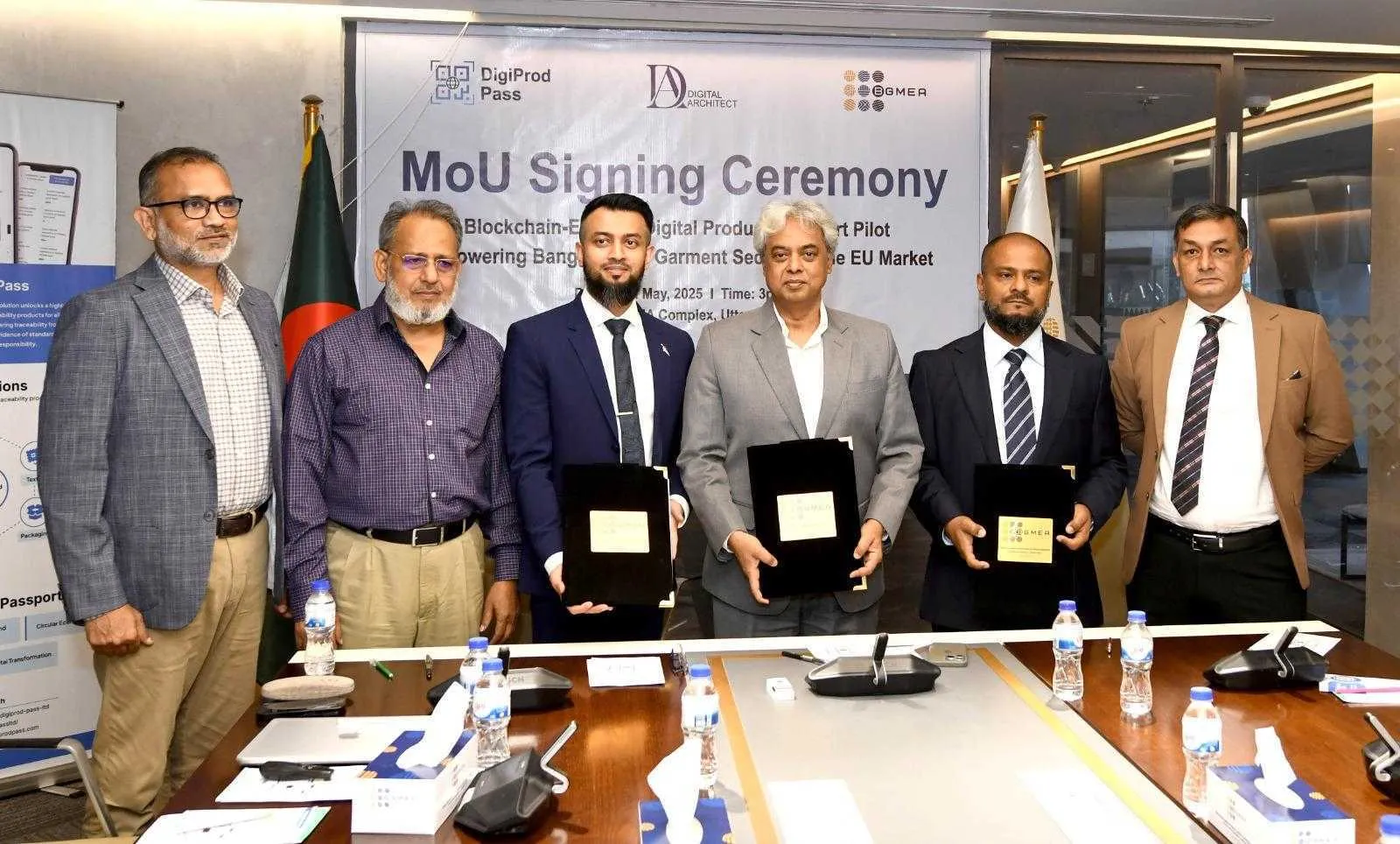DigiProd Pass Celebrates Sustainability: Sustainable Design Awards 2025
DigiProd Pass Celebrates Sustainability: Sustainable Design Awards 2025
On 24 April 2025, the Sustainable Design Awards 2025 ceremony, presented by Sustainable Design Collective and sponsored by DigiProd Pass Ltd, took place at the Crypt on the Green, Clerkenwell, London. The awards recognise efforts to promote sustainability and circularity in the workplace sector.
This year, four organisations won awards for their outstanding achievements in three categories: Camira Fabrics in the Innovation category, Gensler in the Fit out Projects category, and Solus and Humanscale were joint winners in the Products category.

The Sponsorship
DigiProd Pass Ltd promotes circularity and sustainability through a secure, scalable, and future-ready data platform. Importantly, it creates a Digital Product Passport (DPP), a complete digital solution to trace and keep a record of a product’s credentials and sustainability information across its entire lifecycle. A game-changer for greater circularity, the DPP solution provides easily accessible information to all – including designers, manufacturers, repairers, recyclers, ‘second life’ resellers as well as, of course, consumers.
As a leading player in the field of sustainability and circularity across a wide range of industry sectors, including the workplace, DigiProd Pass was proud to sponsor this year’s Sustainable Design Awards.
“We were very grateful to DigiProd Pass for sponsoring the Sustainable Design Awards,” said Joanna Knight, co-founder of the Sustainable Design Collective. “Our annual forum is designed to create a platform for knowledge sharing and collaboration across all sectors of the workplace design community. The evening awards ceremony is the culmination of the day’s activities and provides a wonderful opportunity to thank and champion commitments to greater sustainability.”
Award Categories & Winners
Innovation: Awarded to Camira Fabrics for its ReSKU 2.0 circular fabric, an inherently flame-retardant circular fabric. The fabric is crafted through an intelligent blend of recycled wool (79%) and harvested flax (21%). Camira collects the recycled wool from its own manufacturing waste.
Developed at Camira’s manufacturing sites in Yorkshire, ReSKU 2.0 reduces chemical dye stuff, as the colour palette has been developed with the original colouration of the recycled woollen fibres as its base.
Fit Out Projects: Gensler won the award in this category for the iconic “The Acre” project. This ambitious reinvention of a 1980s Richard Seifert-designed Brutalist office building in London’s Covent Garden sets a new benchmark for adaptive reuse.
By retaining over 80% of the original structure, the 260,000 sq. ft project saved 4,250 tonnes of CO₂ compared to demolition—equivalent to the lifetime emissions of nearly 1,000 UK citizens. The project restores the building’s connection to its surroundings, creating a vibrant, high-performance workplace that is both environmentally and socially impactful.
Products: Joint winners for the product category were “Spolia” by Solus and “Freedom Chair” by Humanscale.
Solus is the last surviving commercial scale, British manufacturer of terrazzo. In the making of Spolia Terrazzo, Solus allows designers to reuse and incorporate waste materials from project sites, helping to dispose of waste from landfills into a sustainable process.
Humanscale’s “Freedom Chair” has, since its introduction in 1999, set the standard for ergonomic excellence. The Freedom chair’s lightweight minimises the environmental impact of its shipping, and its simple, modular design makes it easy to disassemble, recycle and maintain rather than replace the chair completely. The Freedom chair is GREENGUARD Indoor Air Quality and Gold certified. Freedom chairs are also certified carbon positive through their Living Product Challenge certification.
About Sustainable Design Collective
The Sustainable Design Collective’s mission is to work collaboratively to share knowledge and ‘best practice’ to inspire and influence the workplace design sector to effect change and implement solutions which make a positive contribution to the wellbeing of people and the planet.
On 24 April 2025, the Sustainable Design Awards 2025 ceremony, presented by Sustainable Design Collective and sponsored by DigiProd Pass Ltd, took place at the Crypt on the Green, Clerkenwell, London. The awards recognise efforts to promote sustainability and circularity in the workplace sector.
This year, four organisations won awards for their outstanding achievements in three categories: Camira Fabrics in the Innovation category, Gensler in the Fit out Projects category, and Solus and Humanscale were joint winners in the Products category.

The Sponsorship
DigiProd Pass Ltd promotes circularity and sustainability through a secure, scalable, and future-ready data platform. Importantly, it creates a Digital Product Passport (DPP), a complete digital solution to trace and keep a record of a product’s credentials and sustainability information across its entire lifecycle. A game-changer for greater circularity, the DPP solution provides easily accessible information to all – including designers, manufacturers, repairers, recyclers, ‘second life’ resellers as well as, of course, consumers.
As a leading player in the field of sustainability and circularity across a wide range of industry sectors, including the workplace, DigiProd Pass was proud to sponsor this year’s Sustainable Design Awards.
“We were very grateful to DigiProd Pass for sponsoring the Sustainable Design Awards,” said Joanna Knight, co-founder of the Sustainable Design Collective. “Our annual forum is designed to create a platform for knowledge sharing and collaboration across all sectors of the workplace design community. The evening awards ceremony is the culmination of the day’s activities and provides a wonderful opportunity to thank and champion commitments to greater sustainability.”
Award Categories & Winners
Innovation: Awarded to Camira Fabrics for its ReSKU 2.0 circular fabric, an inherently flame-retardant circular fabric. The fabric is crafted through an intelligent blend of recycled wool (79%) and harvested flax (21%). Camira collects the recycled wool from its own manufacturing waste.
Developed at Camira’s manufacturing sites in Yorkshire, ReSKU 2.0 reduces chemical dye stuff, as the colour palette has been developed with the original colouration of the recycled woollen fibres as its base.
Fit Out Projects: Gensler won the award in this category for the iconic “The Acre” project. This ambitious reinvention of a 1980s Richard Seifert-designed Brutalist office building in London’s Covent Garden sets a new benchmark for adaptive reuse.
By retaining over 80% of the original structure, the 260,000 sq. ft project saved 4,250 tonnes of CO₂ compared to demolition—equivalent to the lifetime emissions of nearly 1,000 UK citizens. The project restores the building’s connection to its surroundings, creating a vibrant, high-performance workplace that is both environmentally and socially impactful.
Products: Joint winners for the product category were “Spolia” by Solus and “Freedom Chair” by Humanscale.
Solus is the last surviving commercial scale, British manufacturer of terrazzo. In the making of Spolia Terrazzo, Solus allows designers to reuse and incorporate waste materials from project sites, helping to dispose of waste from landfills into a sustainable process.
Humanscale’s “Freedom Chair” has, since its introduction in 1999, set the standard for ergonomic excellence. The Freedom chair’s lightweight minimises the environmental impact of its shipping, and its simple, modular design makes it easy to disassemble, recycle and maintain rather than replace the chair completely. The Freedom chair is GREENGUARD Indoor Air Quality and Gold certified. Freedom chairs are also certified carbon positive through their Living Product Challenge certification.
About Sustainable Design Collective
The Sustainable Design Collective’s mission is to work collaboratively to share knowledge and ‘best practice’ to inspire and influence the workplace design sector to effect change and implement solutions which make a positive contribution to the wellbeing of people and the planet.
Read More News
Read More News
Award
Webinar
Partnership


